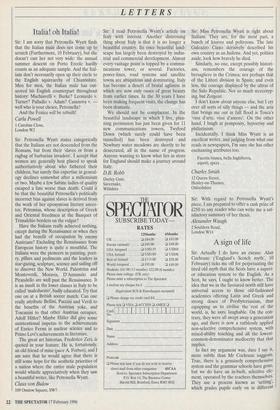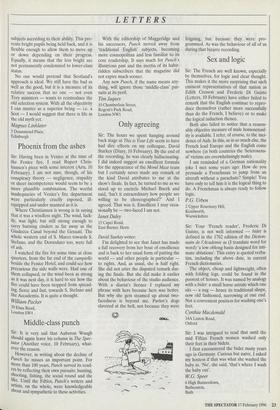A sign of life
Sir: Actually I do have an excuse. Alan Cochrane (`England's Scotch myth', 10 February) ticks me off for perpetuating the tired old myth that the Scots have a superi- or education system to the English. As a Scot, he says, I ought to know better. The idea that we in the favoured north still have universal access to those old-fashioned academies offering Latin and Greek and strong doses of Presbyterianism, thus equipping us to civilise the rest of the world, is, he says, laughable. On the con- trary, they were all swept away a generation ago, and there is now a ruthlessly applied non-selective comprehensive system, with mixed-ability teaching and all the lowest- common-denominator mediocrity that that implies. In fact my argument was, dare I say it, more subtle than Mr Cochrane suggests. True, there is a genuinely comprehensive system and the grammar schools have gone, but we do have an in-built, selective ele- ment, operated by the teachers themselves. They use a process known as 'setting which grades pupils early on in different subjects according to their ability. This pre- vents bright pupils being held back, and it is flexible enough to allow them to move up or down depending on their progress. Equally, it means that the less bright are not permanently condemned to lower-class status.
No one would pretend that Scotland's approach is ideal. We still have the bad as well as the good, but it is a measure of its relative success that no one — not even Tory ministers — wants to reintroduce the old selection system. With all the objectivity I can muster as a superior being — i.e. a Scot — I would suggest that there is life in the old myth yet.
Magnus Linklater
5 Drummond Place, Edinburgh



























































 Previous page
Previous page